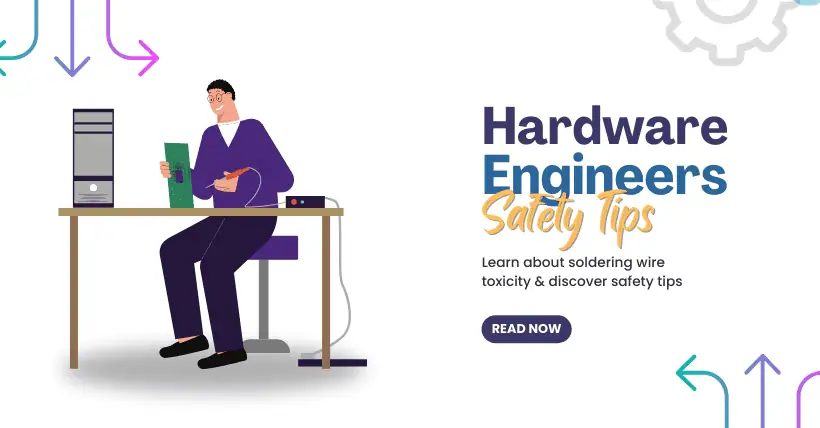Some netizens complained that after using an electric soldering iron to solder in a PCB factory for a whole year, they started feeling unwell, with some abdominal bloating. Is solder toxic? Could it cause lead poisoning?
It depends on whether the solder wire used with the electric soldering iron contains lead or is lead-free, and regular blood lead checks are needed. If the levels are not exceeded, there should be no problem.
Generally speaking, if protection and raw material procurement are by national standards, soldering will not cause significant harm, and most products used now are lead-free.
Lead is a toxic substance, and excessive absorption by the human body can cause lead poisoning. Even low-dose intake may affect intelligence, the nervous system, and the reproductive system.
An alloy of tin and lead, which is commonly used solder, has good electrical conductivity and a low melting point, so it has long been used in welding processes. Its toxicity mainly comes from lead, and the lead fumes produced by soldering can easily lead to lead poisoning.
Metallic lead may form lead compounds, all classified as hazardous substances. In the human body, lead can affect the central nervous system and kidneys. Lead’s environmental toxicity to some organisms has been widely confirmed.
Blood lead concentrations above 10 μg/dl can cause sensitive biochemical effects, and long-term exposure causing blood lead levels to exceed 60~70 μg/dl can result in clinical lead poisoning.
Lead-containing solder is toxic. Even if not severe, excessive exposure to any metal can cause poisoning. During soldering, fumes appear, containing elements harmful to the body.
It is best to wear a mask when working, though it might still have some effect. Using lead-free solder wire is much safer than leaded solder wire.
Is lead-free solder toxic?
The solder wire used in electric soldering irons primarily consists of tin but also contains other metals, categorized into leaded and lead-free (environmentally friendly) types.
With the introduction of the EU ROHS standard, more PCB soldering factories are opting for lead-free, environmentally friendly solder. Leaded solder wire is gradually being phased out, as non-environmental products cannot be exported.
Lead-free solder paste, lead-free solder wire, and lead-free solder bars are the main products currently on the market. In simple terms, common solder is toxic due to its low melting point, containing about 60% lead and 40% tin, thus inherently toxic.
Most solder on the market is hollow, and filled with rosin, so the gas you mentioned is likely the rosin evaporating during soldering. The gas released from rosin is also slightly toxic and unpleasant. The primary hazard during soldering is lead fumes, even in lead-free solder, which still contains some lead.
Lead fumes have a low threshold in GBZ2-2002, are highly toxic, and require significant protection due to the damage caused by the welding process to both humans and the environment.
In Europe, protection for welders and environmental protection has been legally enforced, and welding without protective measures is not allowed.
ISO14000 standards specify the handling and protection against pollution produced during manufacturing. Tin used to contain lead, classifying soldering as an occupational hazard (listed in the National Occupational Disease Directory).
Now, most companies use lead-free solder wire, mainly consisting of tin. The Disease Prevention Control Center tests for tin dioxide, which is not listed in the National Occupational Disease Directory.
Lead-free processes (lead-free) generally do not exceed lead fume limits, but soldering still presents other hazards, such as flux (rosin substances), which are harmful depending on the specific situation.
Employees can check the labels of the solder provided to them to determine its type and request factory adjustments if needed (suggestions can be made to the internal factory union). If the solder contains lead, it is harmful to health, accumulating in the body over time and significantly damaging the nervous system and immune system.
Lead-free solder wire is environmentally friendly but still harmful to the human body. Lead-free solder wire contains low levels of lead but is not lead-free. Compared to leaded solder wire, lead-free solder wire poses less environmental and health risk.
How to prevent toxicity from solder wire with an electric soldering iron:
Firstly, PCB factories should use ROHS-compliant solder wire when soldering components with an electric soldering iron, and take preventive measures: wearing gloves, masks, or respirators, ensuring workplace ventilation, and good exhaust systems, cleaning up after work, and drinking milk to prevent lead toxicity from solder.
Additionally, taking breaks is essential, generally taking a 15-minute break every hour to alleviate fatigue, as resistance is lowest when fatigued. Reduce smoking and drink more water to expel most of the harmful substances absorbed during the day.
Related:
- 5D Method for Solder Paste Selection in PCBA Process
- Key SMT Printing and Reflow Soldering Procedures Guide
- Solder Paste Issues in WLP: Full Guide from Process to Tools
- In-Depth Guide to Solder Paste Viscosity Levels
- Why Gold Is Plated on Wafers After Nickel Layer
- Wire Bonding Process: Key Steps for Reliable Connections
- Using Expired Solder Paste: Risks and Tips
- Dangerous Chemicals in Semiconductor Manufacturing Process
- BGA Solder Paste vs Regular Paste: Key Differences Explained
- Prevent Solder Ball Defects in PCBA Manufacturing

Disclaimer: This article is created by the original author. The content of the article represents their personal opinions. Our reposting is for sharing and discussion purposes only and does not imply our endorsement or agreement. If you have any objections, please contact us through the provided channels.








